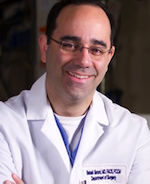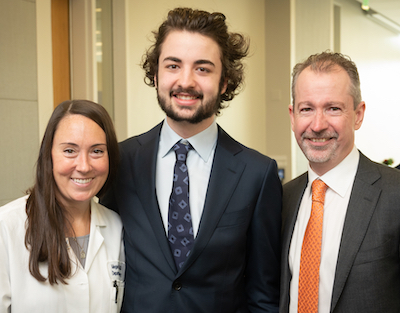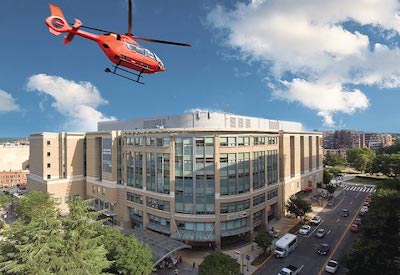A Level I Verified Trauma Center
The Center for Trauma and Critical Care (CTACC) at The George Washington University Hospital provides premier care to severely injured and critically ill patients for 80 miles surrounding the Greater Washington, DC metropolitan area. It is an American College of Surgeons (ACS) Level I verified trauma center that evaluates and treats more than 1,600 patients per year.
Babak Sarani, MD, FACS, FCCM
 Dr. Sarani is the Founder and Chief of the Center for Trauma and Critical Care at GW Hospital, a Professor of Surgery and Emergency Medicine at the GW University School of Medicine & Health Sciences, and President of the Chest Wall Injury Society. He is currently the Chair of the American College of Surgeons Committee on Trauma for Washington, DC.
Dr. Sarani is the Founder and Chief of the Center for Trauma and Critical Care at GW Hospital, a Professor of Surgery and Emergency Medicine at the GW University School of Medicine & Health Sciences, and President of the Chest Wall Injury Society. He is currently the Chair of the American College of Surgeons Committee on Trauma for Washington, DC.
Trauma Surgery
Trauma surgeons, emergency medicine physicians, trauma-trained nurses, anesthesiologists and operating room personnel are available 24 hours a day, seven days a week to evaluate and treat any injury. Located six blocks from the White House, three blocks from the State Department, and across the street from the World Bank, the Center for Trauma and Critical Care at GW Hospital is prepared to service a diverse group of patients, from area residents to visiting dignitaries and heads of state.
Along with a wide range of specialists, including neurosurgeons, orthopedic surgeons, otolaryngologists and rehabilitation specialists, we are able to treat all kinds of injuries at any time of day or night.
Resuscitation from Bleeding and Shock
Based on reports and lessons learned from our military colleagues, the CTACC became the first hospital in Washington, DC to provide whole blood as a means to resuscitate bleeding patients. This practice has been shown to decrease overall bleeding and increase the chances of survival following severe injury.
The GW Blood Bank, Department of Pathology, and CTACC worked with DC Fire/EMS to implement the prehospital whole blood transfusion program for Washington, DC. GW Hospital serves as the hospital from which DC Fire/EMS obtain whole blood for use in the prehospital setting. This program has dramatically decreased death following injury.
Control of Bleeding
The Center also uses advanced strategies, such as partial-REBOA, to stop bleeding as soon as possible. CTACC was the first hospital in the DC Metropolitan Region to be allowed to participate in the partial-REBOA program due to our commitment to provision of evidence-based approaches for control of severe bleeding and is the only REBOA Center of Excellence in the tristate region. CTACC is also the leading center in Washington, DC for endovascular management of bleeding following injury.
Chest Wall Injury and Rib Fractures
Babak Sarani, MD, FACS, FCCM, Chief of Trauma and Acute Care Surgery at GW Hospital, is a founding member of the Chest Wall Injury Society. The trauma surgeons at GW Hospital continue to serve in leadership roles in this Society. GW Hospital was the first hospital to create specific pathways for surgical management of patients with severe rib fractures/chest wall injury. It has the most published experience with management of chest wall injury. It is currently the only hospital in the DC Metropolitan Region to be recognized by the Chest Wall Injury Society as a collaborative center of excellence.
Pain Relief
Along with specialists for all medical and surgical disciplines, CTACC also works very closely with the George Washington University Acute Pain Service to control pain using a multi-modality approach that seeks to minimize or avoid use of opioids. This service, which is provided by the Department of Anesthesiology and Critical Care, provides evidence-base care that is not commonly found in most hospitals, including other trauma centers. Such care includes use of ketamine and lidocaine infusions, regional blocks, and non-opioid oral medications to control pain.
Podcast: What is a Level I Trauma Center?
Babak Sarani, MD, FACS, FCCM, explains what the designation of a Level I Trauma Center means to patients in need of emergency care. He discusses the staffing, equipment and procedures that go into providing care for the most critically injured patients.
Patient Direct Admit Process
- Physicians can directly admit their patients for treatment at GW Hospital. Follow these steps to direct admit a patient →
- Download the direct admit medicine form and fax to 202-715-5608.
- Download the direct admit surgery form and fax to 202-715-5608.
Patient Transfer Center
GW Hospital offers quarternary level support to surrounding hospitals that seek advice or help in the management of severely injured or critically ill patients. Quarternary care refers to hospitals that provide all medical service, such as trauma and organ transplant. Transport for patients can be arranged as requested by a referring physician or hospital.
For transfer requests, please call 1-855-SEND-2-GW or 1-855-736-3249. This service is available 24 hours a day, seven days a week.
Trauma Survivors Network
The Center for Trauma and Critical Care is a proud member of the American Trauma Society Trauma Survivor’s Network (TNS). The program includes a monthly support group meeting, individual peer-to-peer support sessions and annual events to honor and celebrate trauma survivors. The GW Hospital TSN program engages with multiple departments within the hospital and with other hospitals in the country to provide the most appropriate support and opportunities for trauma survivors in the region. The group is open to all trauma survivors, family members and loved ones. It is a space where individuals who have experienced traumatic injury can connect with others who have experienced similar circumstances.
Trauma Survivors Day
 Since 2012, GW Hospital has held an annual celebration for patients who survived extremely severe injuries. This day provides an opportunity for our staff to re-engage with these patients, give thanks for their recovery and also for our own fortunes, and highlight the rewards of our collective service as care providers. Members from all departments of the hospital and medical staff join 4-6 select patients in this annual celebration.
Since 2012, GW Hospital has held an annual celebration for patients who survived extremely severe injuries. This day provides an opportunity for our staff to re-engage with these patients, give thanks for their recovery and also for our own fortunes, and highlight the rewards of our collective service as care providers. Members from all departments of the hospital and medical staff join 4-6 select patients in this annual celebration.
GW Hospital Patient Logistics Center and Critical Care Transport Team
The GW Hospital Patient Logistics Center (PLC) serves as the center of the bed control system for the hospital. Its roles include coordinating all transfers from outside facilities to GW Hospital, as well as overseeing patient flow within the hospital. In doing so, the PLC aligns GW Hospital with our community partners for an 80-mile radius to offer the expertise that CTACC and the entire hospital have to patients throughout the region. The PLC oversees over 2,000 referrals per year to GW Hospital and is staffed by dedicated, ICU-trained triage nurses 24 hours per day, 7 days per week.
Patients can be referred to GW Hospital from any outside facility by calling 855-SEND-2-GW (855-736-3249).
The PLC works with a GW-Hospital dedicated critical care transport team to quickly facilitate the transfer of severely ill or injured patients. The team is staffed by dedicated nurses with advanced skills relevant to the inter-hospital environment, and with critical care trained paramedics and EMTs. The critical care transport team functions as a mobile intensive care unit. It is able to provide any care that is traditionally restricted to the ICU setting while transporting a patient in an ambulance.
 In addition to critical care ground transportation, the GW Hospital PLC is able to arrange aero-medical flights for patients who are located too far from Washington, DC or whose condition is too precarious to allow for ground transportation. In short, the PLC’s moto is "no one is too unstable to transfer."
In addition to critical care ground transportation, the GW Hospital PLC is able to arrange aero-medical flights for patients who are located too far from Washington, DC or whose condition is too precarious to allow for ground transportation. In short, the PLC’s moto is "no one is too unstable to transfer."
Education
The Center for Trauma and Critical Care is committed to educating all members of the care team — from field emergency medical providers to physicians and nurses. Our Acute Care Education (ACE) program offers in-person and hybrid courses to all levels of providers. We offer multiple educational opportunities and classes annually for providers regionally and nationally. These include:
- Advanced Trauma Life Support (ATLS), offered at least quarterly and more often when needed. Recently, CTACC also held the inaugural ATLS Instructor Course at George Washington University, thus making GW Hospital the only facility that offers an ATLS instructor course in Washington, DC.
- Fundamentals of Critical Care Support (FCCS)
- Emergency Neurological Life Support
- Trauma Symposium
- Stop the Bleed
- Trauma Nursing Core Course (TNCC)
- Advanced Trauma Care for Nurses (ATCN)
Cutting-edge Trauma Research
Research into advanced methods and processes of care is a core function of the Center for Trauma and Critical Care. The Center routinely publishes novel research projects related to brain injury, orthopedic injury, bleeding and resuscitation, emergency medicine, critical care, and numerous other topics within the field of acute care surgery. Trauma surgeons serve as invited speakers at leading local, regional and national meetings, including the American Association for the Surgery of Trauma, The Eastern Association for the Surgery of Trauma, The Society of Critical Care Medicine, The Society for Academic Emergency Medicine and The American Academy of Emergency Medicine.
GW Hospital is the only hospital in Washington, DC to have participated in two EFIC (exception from informed consent) studies regarding trauma surgery: The TAP trial and the ProTECT III trial. We continue to participate in novel medical studies to discover ways to decrease chances of mortality and complications following any injury. Based on our intimate role in the prehospital transfusion program in Washington, DC, we are currently leading multiple studies evaluating outcomes of prehospital transfusion both in Washington, DC as well as in other major cities in the United States.
The American College of Surgeons (ACS) (2024) National Surgical Quality Improvement Program (NSQIP)
 The ACS NSQIP is a standards-based data registry designed to improve hospital-wide quality across all surgical departments. ACS NSQIP helps surgical and quality teams make informed decisions about the improvement of quality of care while reducing complications and costs.
The ACS NSQIP is a standards-based data registry designed to improve hospital-wide quality across all surgical departments. ACS NSQIP helps surgical and quality teams make informed decisions about the improvement of quality of care while reducing complications and costs.
Prevention and Outreach
The Center for Trauma and Critical Care is also focused on injury prevention. We have a dedicated injury prevention team committed to identifying patterns of injury and directing our prevention efforts accordingly. We offer the following injury prevention programs:
Hospital Based Violence Intervention Program (HVIP)
GW Hospital’s HVIP offers wrap-around/outreach services to all violently injured patients. Services include safe housing, employment services, mental health services and more. Additionally, members from the HVIP team participate in monthly meetings with city leaders regarding violence prevention in the region.
Vision Zero (Bicycle/Pedestrian/Motor Vehicle Related Injuries)
The injury prevention team partners with local organizations and government agencies to carry out Vision Zero related activities throughout the year. These include participating in the annual Vision Zero summit, advocating for safer streets and improvements to traffic safety laws, and participating in other initiatives to promote traffic safety in the region.
DC Families for Safe Streets
The injury prevention team partners with DC Families for Safe Streets (DCFFSS) to support trauma survivors and to advocate for safer streets in the region. A member from our team attends monthly DCFFSS meetings to plan events throughout the year and to coordinate support for local and national traffic-related legislation.
Fall Prevention
The injury prevention team partners with the GW Hospital School of Medicine and Health Sciences to provide fall risk reduction sessions with older adult patients who are at risk of falling. Risk reduction sessions include fall prevention education, problem solving and additional resources.
Alcohol and Drug-related Injury Prevention
The injury prevention team is dedicated to ensuring that all injured patients are screened for alcohol and drug use. This process helps our team identify patients who are at an elevated risk of serious injury due to alcohol and/or drug use. Patients who screen positive are provided with a brief intervention and referral to treatment.
Future Directions
The Center for Trauma and Critical Care will be starting a new Trauma Center at Cedar Hill Regional Medical Center GW Health in Anacostia, Washington, DC in 2025. This will be the first trauma center ever to be located in this area of the city.
Schedule a Follow-up Appointment
If you were previously at the Center and need to schedule a follow-up appointment at the trauma clinic, please call 202-677-6219.
